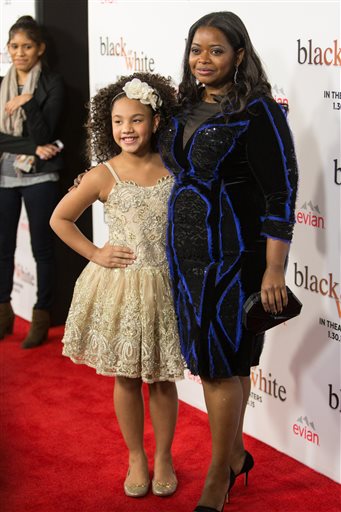Black or White- A movie that does little to challenge stereotypes

Jillian Estell and Octavia Spencer attend the Los Angeles Premiere of “Black or White” held at Regal Cinemas on Tuesday, Jan 20, 2015, in Los Angeles. (Photo by Paul A. Hebert/Invision/AP
February 4, 2015
There are movies, such as the powerful historical drama “Selma,” that beautifully showcase people of color transcending the labels that society has cast on them. There are also movies that include characters who do nothing but perpetuate racial stereotypes. The recently released drama “Black or White,” which features a talented cast of stereotypes, falls firmly into the latter category.
There is hardly a single character in this movie who is not a textbook example of a racial stereotype. There’s the rich white lawyer, Elliot (Kevin Costner), a middle aged man with a large checkbook and a drinking problem who is left to raise his biracial granddaughter, Eloise (Jillian Estell), alone after both his wife and daughter die. There’s “Grandma Wee-Wee” (Octavia Spencer), the matriarch of a stereotypical black family who is seemingly blind to her son’s crack addiction. And then there’s her son, Eloise’s father, a junkie who got his 17-year-old girlfriend pregnant when he was 23 and spends his days smoking crack on the porch and convincing everybody that he’s clean.
It’s not just the main characters who stand comfortably under the umbrella of overdone stereotypes. The “black side” of young Eloise’s family seems to spend all of their time hanging out on the porch of their house, which is situated in a disadvantaged area of Los Angeles. Deep-pocketed grandfather Elliot’s maid is a Latina woman named Rosalita who barely speaks a word throughout the entire film. And, lest you think that only negative stereotypes are represented in “Black or White,” the film also includes Eloise’s hardworking immigrant tutor Duvan (Mpho Koaho), who never misses an opportunity to market himself or his plentiful academic papers.
Despite the plethora of one-dimensional characters, the plot of the film is done with a decent amount of heart and feeling. The main conflict of the movie is between Rowena (aka “Grandma Wee Wee”) and Elliot as they fight for custody of the bright and charming Eloise. Both sides present a decent argument as to why Eloise should live with them: Rowena has a house full of family and cultural love, while Elliot has been living with his granddaughter her whole life. However, Elliot also has a drinking problem that has manifested since the death of his wife, Eloise’s grandmother.
Despite this drinking problem, Elliot is portrayed as the most competent caretaker for his granddaughter. Elliot’s addiction is juxtaposed with the crack addiction of Eloise’s father, Reggie, in a way that raises questions about race. Why is the alcoholic Elliot fit to take care of Eloise while Reggie’s loving side of the family is not? The answer, viewers can assume, is as simple as black and white.
That is where “Black or White” squanders an opportunity to start a conversation about race. Instead of taking an in-depth look at racial prejudice, the film glazes over the topic in favor of a “happy-but-only-kinda” ending. Instead of going in-depth on the topic of race relations, the movie presents stereotypical characters and features an ending that viewers could probably guess within the first few minutes of the movie.
While “Black or White” certainly does not challenge any racial stereotypes, it is a fairly decent movie with an entertaining plot and a charming young actress. If you’re looking for a movie that you can enjoy without much thought, this is it. However, if you’re looking for a movie that raises questions and conversations about race relations, go see “Selma” instead.










Mrs. Kratz • Feb 4, 2015 at 1:52 pm
What a well-written, thoughtful review! Your analysis is excellent, your writing concise. The professional review I read offered a similar opinion, but your examples were much harder-hitting and more powerful. Well-done.